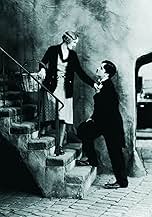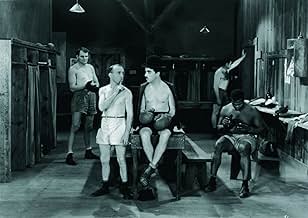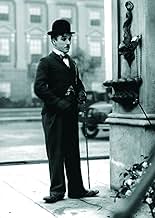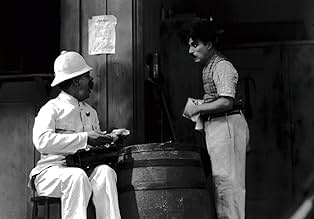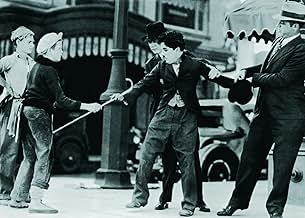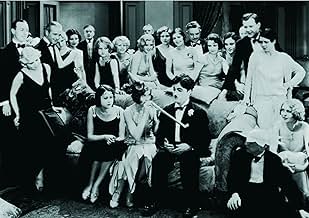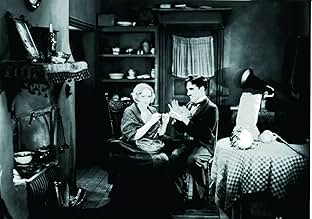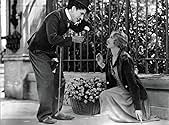Mithilfe eines reichen, aber launischen Gewohnheitstrinkers häuft ein vertrauensseliger Vagabund, der sich in ein blindes Blumenmädchen verliebt hat, möglichst viel Geld an, um ihr medizinis... Alles lesenMithilfe eines reichen, aber launischen Gewohnheitstrinkers häuft ein vertrauensseliger Vagabund, der sich in ein blindes Blumenmädchen verliebt hat, möglichst viel Geld an, um ihr medizinische Hilfe zukommen zu lassen.Mithilfe eines reichen, aber launischen Gewohnheitstrinkers häuft ein vertrauensseliger Vagabund, der sich in ein blindes Blumenmädchen verliebt hat, möglichst viel Geld an, um ihr medizinische Hilfe zukommen zu lassen.
- Regie
- Drehbuch
- Hauptbesetzung
- Auszeichnungen
- 6 wins total
Charles Chaplin
- A Tramp
- (as Charlie Chaplin)
Al Ernest Garcia
- The Millionaire's Butler
- (as Allan Garcia)
Johnny Aber
- Newsboy
- (Nicht genannt)
Jack Alexander
- Boxing Match Spectator
- (Nicht genannt)
T.S. Alexander
- Doctor
- (Nicht genannt)
Victor Alexander
- Superstitious Boxer
- (Nicht genannt)
Albert Austin
- Street Sweeper
- (Nicht genannt)
- …
Harry Ayers
- Cop
- (Nicht genannt)
Eddie Baker
- Boxing Fight Referee
- (Nicht genannt)
Henry Bergman
- Mayor
- (Nicht genannt)
- …
Edward Biby
- Nightclub Patron
- (Nicht genannt)
Betty Blair
- Woman at Center of Table in Restaurant
- (Nicht genannt)
Buster Brodie
- Bald Party Guest
- (Nicht genannt)
Jeanne Carpenter
- Diner in Restaurant
- (Nicht genannt)
Zusammenfassung
Reviewers say 'City Lights' is celebrated for its blend of comedy and pathos, showcasing Charlie Chaplin's iconic Tramp character in a poignant love story with a blind flower girl. The film is praised for its masterful physical comedy, expressive acting, and memorable scenes, particularly the boxing match and the emotional finale. Chaplin's direction, composition of the score, and the film's historical significance are frequently highlighted. However, some reviewers note that the silent format and slow pacing may challenge modern audiences. The themes of love, selflessness, and social commentary resonate deeply, making 'City Lights' a timeless classic.
Empfohlene Bewertungen
Chaplin takes himself a little more seriously in City Lights, and the results are spectacular. The musical score which Chaplin composed for the film was one of the many highlights, and even though Charlie's performance is much more dramatic than usual in some scenes, the hilarious comedy for which he is known and loved is still abundant.
City Lights is so well made that it is one of the very few movies in which the obvious flaws can be gladly overlooked. Yes, you can clearly see the string holding Chaplin up in the sidesplittingly funny boxing scene, but who cares? That is such classic slapstick that little things like that really don't matter. Besides, let's keep in mind that this movie was made seventy years ago.
Chaplin does a phenomenal job in his traditional role of the tramp, and develops a perfectly convincing romantic relationship with the blind flower girl on the sidewalk. His friendship with the drunken rich guy is hilarious, but it also makes a significant comment about the problems of alcohol. This is truly a great film, which should not be forgotten.
City Lights is so well made that it is one of the very few movies in which the obvious flaws can be gladly overlooked. Yes, you can clearly see the string holding Chaplin up in the sidesplittingly funny boxing scene, but who cares? That is such classic slapstick that little things like that really don't matter. Besides, let's keep in mind that this movie was made seventy years ago.
Chaplin does a phenomenal job in his traditional role of the tramp, and develops a perfectly convincing romantic relationship with the blind flower girl on the sidewalk. His friendship with the drunken rich guy is hilarious, but it also makes a significant comment about the problems of alcohol. This is truly a great film, which should not be forgotten.
City Lights is simply put one of the best movies out there. Every scene is classic and had a huge impact on the history of film-making. Chaplin's last 'silent' film tells the story of a poor little man the tramp played by Chaplin who falls in love with a blind flower girl. He becomes friends with a wealthy man who constantly tries to commit suicide. The man only recognizes the tramp character when he is drunk. To impress the flower girl the tramp uses the man's wealth to make her fall in love with him. The only problem is that when the man is sober he doesn't recognize the tramp anymore. On top of this the flower girl has to pay 22 dollars of rent or she will be thrown out of her apartment. Now the tramp desperately seeks for jobs in the city to help his love. Out of this simple plot great comedy and heart breaking moments come forth.
The outcome of the movie is to almost all people known. It is regarded as one of the best endings ever taped on film. The movie itself still is masterpiece more than 70 years after it's release. I personally rate this as Chaplin's second best I have seen so far. My favorite remains The Gold Rush. Still this movie gets 5/5 stars from me.
The outcome of the movie is to almost all people known. It is regarded as one of the best endings ever taped on film. The movie itself still is masterpiece more than 70 years after it's release. I personally rate this as Chaplin's second best I have seen so far. My favorite remains The Gold Rush. Still this movie gets 5/5 stars from me.
Once again Chaplin plays his famous creation, the beloved Tramp
The noble Little Fellow meets and falls in love with a blind flower girl
She assumes he is wealthy man and offers him a flower, which he attentively accepts with his last penny
One night by chance he rescues a drunken millionaire from drowning The rich gentleman becomes a generous friend when drunk but doesn't recognize the tramp when sober Chaplin takes the blind girl under his wing, and takes flight with the millionaire's money to cure her blindness
"City Lights" engaged a true genius in a graceful and touching performance which arouses profound feelings and joy with great simplicity of style and tragic tale Each scene was the result of hard-working detail and planning
One night by chance he rescues a drunken millionaire from drowning The rich gentleman becomes a generous friend when drunk but doesn't recognize the tramp when sober Chaplin takes the blind girl under his wing, and takes flight with the millionaire's money to cure her blindness
"City Lights" engaged a true genius in a graceful and touching performance which arouses profound feelings and joy with great simplicity of style and tragic tale Each scene was the result of hard-working detail and planning
This is my favorite Chaplin film, but I don't want that to diminish his other work, either. MODERN TIMES was an outstanding work of social satire, THE GOLD RUSH was great slapstick, and even the largely-neglected MONSIEUR VERDOUX strikes a certain unforgettable tone. Chaplin didn't make a bad movie, and I'm not even sure that CL is his best, exactly. But it IS my favorite, if only for the ending.
That ending has been the subject of much comment here. I think it's a masterpiece in a single scene. Chaplin's little tramp has never seemed less like a character and more like a living, breathing human being. It's a monument to understated sentimentality.
To me, the rest of the film exists largely to set the context for that one magnificent piece of celluloid. Yes, the boxing scene is great, and the scene where he rescues the millionaire is also wonderful, but it's that ending that makes us all love this movie.
That ending has been the subject of much comment here. I think it's a masterpiece in a single scene. Chaplin's little tramp has never seemed less like a character and more like a living, breathing human being. It's a monument to understated sentimentality.
To me, the rest of the film exists largely to set the context for that one magnificent piece of celluloid. Yes, the boxing scene is great, and the scene where he rescues the millionaire is also wonderful, but it's that ending that makes us all love this movie.
Film has become a medium that is strongly influenced by nostalgia. Old films have become journeys to the past; ways to visit times and people that no longer are. Since film is an art that is based on the innovation of previous works, it has an element of nostalgia in its foundation. We look on the old to find what elements should make up the new. In City Lights, and other silent works of film, a passion emerges that is uniquely honest and sincere. While watching the film, I was impressed that Chaplin really did love the story, the sets, the crew; the whole project. While this may not have been the complete reality, it felt that way, and thus made the film more enjoyable. In silent films the audience is forced to be completely reliable on the visual elements of the film; there are no elaborate sound effects or dialogue to provoke an emotional response.
Since film is at its very core a visual medium, I find silent films to be the basic form of the medium. I don't use the word basic here in a demeaning sense, but I compare the beauty of silent films to the beauty of early European art, before the concept of perspective was developed in the Renaissance. Many books and tomes featured people as tall as the castles they stood in; these works of art were not technologically advanced, but they were, and are, beautiful. The same example is found when comparing early darreographs of wild animals to contemporary photographs found in National Geographic. There is a warmth found in City Lights, and other Chaplin films (The Kid, Modern Times) that would be lost in the sea of cinematic technology that floods films today. Maybe it's just that with simplicity comes honesty, and honesty is perhaps the most powerful emotion that can cross through the screen and be felt by the viewer.
Since film is at its very core a visual medium, I find silent films to be the basic form of the medium. I don't use the word basic here in a demeaning sense, but I compare the beauty of silent films to the beauty of early European art, before the concept of perspective was developed in the Renaissance. Many books and tomes featured people as tall as the castles they stood in; these works of art were not technologically advanced, but they were, and are, beautiful. The same example is found when comparing early darreographs of wild animals to contemporary photographs found in National Geographic. There is a warmth found in City Lights, and other Chaplin films (The Kid, Modern Times) that would be lost in the sea of cinematic technology that floods films today. Maybe it's just that with simplicity comes honesty, and honesty is perhaps the most powerful emotion that can cross through the screen and be felt by the viewer.
Wusstest du schon
- WissenswertesChaplin re-shot the scene in which the Little Tramp buys a flower from the blind flower-girl 342 times, as he could not find a satisfactory way of showing that she thought the mute tramp was wealthy.
- Patzer(at around 50 mins) When the man swallows part of the Tramp's soap and starts spraying bubbles, the tube used to spray the bubbles is clearly visible behind him.
- Zitate
The Tramp: You can see now?
A Blind Girl: Yes, I can see now.
- Alternative VersionenAbout seven minutes of footage of Georgia Hale playing the flower girl exists and is included in the 2003 DVD release. The footage was shot during a brief period when the actress originally cast to play the character had been fired and replaced with Hale, but Charles Chaplin was forced to resume filming with the original actress due to the amount of film already shot.
- VerbindungenEdited into Geschichte(n) des Kinos: Fatale beauté (1994)
Top-Auswahl
Melde dich zum Bewerten an und greife auf die Watchlist für personalisierte Empfehlungen zu.
Details
- Erscheinungsdatum
- Herkunftsland
- Offizieller Standort
- Sprachen
- Auch bekannt als
- Lichter der Großstadt - Eine Komödien-Romance als Pantomime
- Drehorte
- Produktionsfirma
- Weitere beteiligte Unternehmen bei IMDbPro anzeigen
Box Office
- Budget
- 1.500.000 $ (geschätzt)
- Bruttoertrag in den USA und Kanada
- 19.181 $
- Eröffnungswochenende in den USA und in Kanada
- 9.102 $
- 8. Juli 2007
- Weltweiter Bruttoertrag
- 55.154 $
- Laufzeit
- 1 Std. 27 Min.(87 min)
- Farbe
- Sound-Mix
Zu dieser Seite beitragen
Bearbeitung vorschlagen oder fehlenden Inhalt hinzufügen

